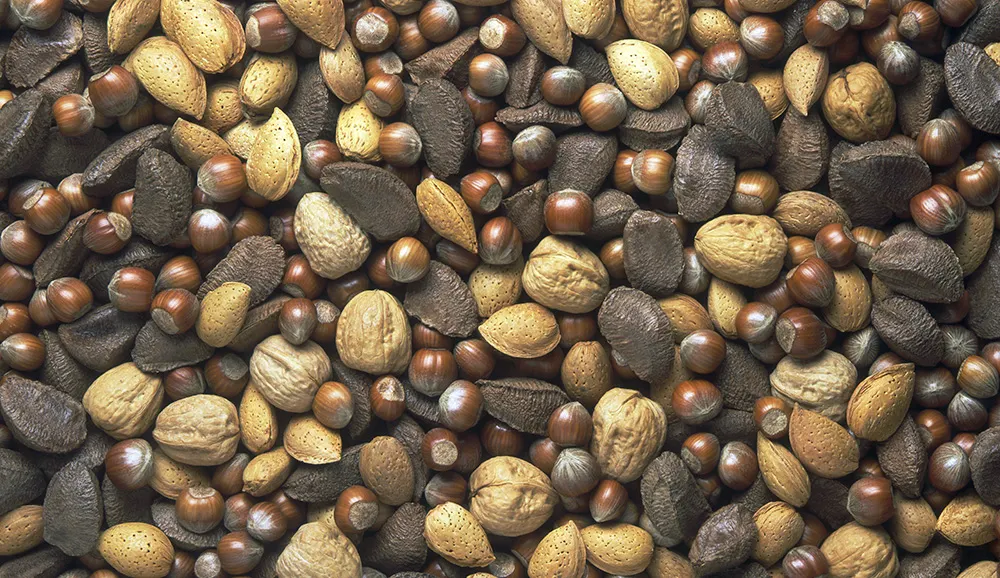Going Nutty

What is a nut?
Scientifically and botanically the definition of a nut is quite specific. It will a fruit with a hard shell containing a seed. The shell, which does not open, will be inedible while the seed is usually edible.
Brazils, walnuts, almonds, chestnuts and pistachio are botanically classed as seeds. A peanut is not regarded as a nut but as a legume, like peas and beans.
In everyday usage, however, they are all nuts. To say a Brazil nut is really a seed, although correct, it sounds boring and irrelevant to anyone outside the botanic community.
So how good are they, food-wise? Answer - extremely good.
The list of healthy benefits from the nut world is enormous. They give us protein, vitamins, minerals and good fats.
The most familiar nuts and the most easily available tend to be:
Almonds
Brazils
Cashews
Chestnuts
Hazelnuts
Macadamias
Peanuts
Pecans
Pistachios
Walnuts
Some of the benefits of nuts can be found in many different nuts, while some nuts have properties unique to them.
Many nuts are high in monounsaturated fatty acids. This is good fat as far and the human body is concerned. It will reduce the bad cholesterol, Low-Density Lipoprotein and increase High-Density Lipoprotein in the blood, which can lower the risk of heart disease and strokes.
Brazils, cashews, chestnuts, hazelnuts, macadamias, pecans, pistachios and walnuts are in this group.
There are essential minerals, such as copper, manganese, potassium, calcium, iron, magnesium, zinc, and selenium, which all have roles in the healthy growth of cells, helping with digestion and maintaining a good immune system and good bones and joints.
All nuts have some or all of these elements.
Antioxidants are important in neutralising free radicals which can damage cells and provide protect from infection. Many nuts can fulfil this role, with almonds containing biotin and the complex B vitamins in pecans, pistachios and walnuts.
Vitamins B, C and E are common throughout the nut world, as is protein and fibre, all essential requirements for a healthy diet.
Chestnuts and hazelnuts are high in folates, which is good for red blood cells and synthesizing DNA, just like leafy green vegetables.
Cashews are big on vitamins B5 and B6.
Even the modest little peanut can boast a range of qualities, like minerals, antioxidants, protein and monounsaturated fats.
Problems with Nuts
When my parents were young, there were no fat children at their schools and allergies did not seem to exist. Today, some people have a nut allergy. Whatever the cause, I don’t think it can be blamed on the poor little nut.
For nut-lovers, some components in nuts can cause a problem if taken to excess.
Selenium will help against artery disease and is said to help against some cancers and liver cirrhosis. Too much, however, can cause problems like diarrhoea, hair loss, fatigue, joint pain, and even liver and heart problems.
It’s unlikely anyone will binge on nuts to such an extent that these problems arise. It’s more likely someone has gone a bit haywire with supplements. I am not a fan of supplements. Eat decent food instead.
Now Brazils - delicious and full of all sorts of goodies. Better still when covered with quality dark chocolate. The only potential snag is that they are just about the most radioactive food on the planet.
Brazil nut trees can grow to enormous heights, perhaps 50 metres/160 feet and their roots go very deep into the ground. They absorb high levels of radium, a radioactive element, which exists naturally in the soil. Although their radiation level is low, it is still about 1000 higher than some other foods.
Enjoy them but just don’t eat hundreds a day.
I’ll keep eating them - living on the edge, that’s me.
As explained above, some of our beloved nuts are in fact seeds, to the technical expert. Many familiar seeds contain all the good properties of nuts.
Sesame, sunflower, pine and pumpkin seeds are high on the list.
Conclusion
Nuts are an excellent healthy food, although not always cheap. It’s worthwhile making nuts a regular part of the diet. For maximum benefit rotate your choice and eat some every day.
Happy crunching
Copyright 2023. © Healthy Wise & Happy.
All rights reserved.
This site is not a part of Google, Inc. or Google.com, nor is it sponsored or endorsed by Google. YouTube is a trademark of Google, Inc.
Disclaimer: This site is provided for educational purposes only.
Please consult a health professional before implementing any strategy discussed on this website.